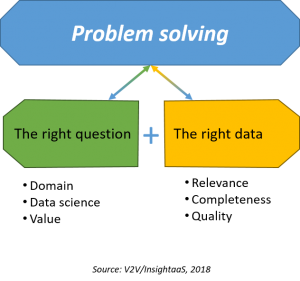The Vision to Value: Economics of Data (V2V) Best Practice community has issued the second report in its ongoing initiative aimed at providing guidance by and for Canadian analytics professionals.
Problem Solving: The Right Data for the Right Question is the second step in an agenda defined by a V2V steering committee late last year. The first report, “Developing the Analytics Business Case,” was released at a Meetup hosted by V2V sponsoring member Information Builders on January 25th. “The right data for the right question” builds on the initial document, drilling down into the sometimes-complex relationship between analytics objectives and evidence.
The report, which was formed with input from 15 Canadian analytics practitioners, executives, suppliers and other experts, begins by examining the challenges associated with formulating the ‘right question’ and securing the “right data” to support a credible response. Discussion on this topic helped illustrate why this issue was identified as a key step in analytics practice: both the question and the data are influenced by several factors, and each in turn has an impact on the other.
According to the report, ‘the question’ actually has two primary dimensions. It begins with the domain question – an articulation of the ‘problem’ that the business is trying to evaluate or solve. This domain question then needs to be translated into a data science question – a question that can be used to structure the analytics approach that is best suited to the business problem. As the graphic below illustrates, there is also a third practical issue associated with the question: whether the value of the solution to the problem will outweigh the costs (professional time, data, opportunity) associated with developing a credible answer.

As the figure shows, the V2V working group also identified three measures to define the ‘right data’: relevance, or the ability of the data to directly address the domain question; completeness, which refers to the ability to build a response that adequately considers all important issues, contexts and related factors that impact the core problem; and quality, or the cleanliness of the data (as one group member pointed out, “dirty data will return a dirty answer.”
The group agreed that questions and data also have an effect on each other: the ‘problem solving’ objective can get lost in the translation between the two sides of the equation. As one working group member observed that “there’s a question that the business wants to ask, but [the question morphs] because it can’t find the data to satisfy the initial request. Question A turns into question A1 – now the right question isn’t being asked any more, and you’re working backwards – you stop asking the question that’s needed.”
This section of the report concludes by noting that maturity – experience with analytics – “is the factor that determines whether the question or the data is most likely to be an organization’s primary obstacle: Organizations that are less experience in terms of analyzing data generally have a harder time with the formation of their questions, while those with more expertise are ‘usually be a lot more accustomed to formulating the questions well, and it’s the gathering of the data that will be the bigger challenge for them.’”
After the section on questions vs. data, the report covers responses to three other questions posed to working group participants:
- Can you offer an example or two from your experience of questions that were ‘wrong’ – in the sense that they didn’t fully address a real business problem – and talk about how you managed this issue, either by reframing the question or by redirecting the (internal or external) client to a different objective?
- How do you make sure that the evidence used in your analytics initiatives provides a complete basis for delivering the right answer to the right question?
- Based on your own experience, what would you consider to be best practices in problem solving: the right data for the right question?
Unveiling the research: Meetup!
Like “Developing the Analytics Business Case,” “Problem Solving: The Right Data for the Right Question” will be released at a live Meetup. This session, scheduled for March 8th from 6:15 to 8:30 at Information Builders (150 York St., Toronto), combines management perspective, practitioner insights and peer networking:
- 6:15-6:20 – Welcome
- 6:20-6:40 – Information Builders Canada VP and general manager Brian Joynt will chair a session on why “problem solving: the right data for the right question” is important in a business context
- Guests: Michael Ray, Director, Data Management Branch, Ontario Ministry of Labour; Mukesh Sharma, Data Quality Management in Manulife Investment Division
- 6:40-7:35 – InsightaaS principal analyst Michael O’Neil will facilitate a discussion on how analytics professionals approach “problem solving: the right data for the right question.”
- Panelists include report contributors Glenda Schmidt (OECM), Victor Magdic (Concept Flow) and Vlad Skorokhod (Eclairesys), plus Ganesh Iyer of Information Builders
- 7:35-8:30 – Networking reception
We hope to see you in the audience! Contributors to the report will be identified and available as resources to attendees. Please note that advance registration is required for admission. If you’d like to attend, please email us at meetup@insightaas.com.








